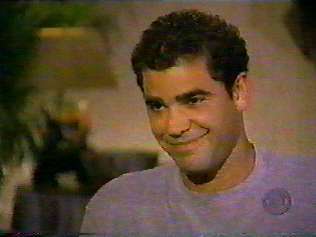Pete's Interview on 60 Minutes II
January 25, 2000
 Pete Sampras already
holds a firm place in the tennis history books, but he intends to become
unequivocally the best. At this year's Australian Open he has this ambition
in his sights. He has the chance to win his thirteenth Grand Slam, more
than any other player in the history of men's tennis.
Pete Sampras already
holds a firm place in the tennis history books, but he intends to become
unequivocally the best. At this year's Australian Open he has this ambition
in his sights. He has the chance to win his thirteenth Grand Slam, more
than any other player in the history of men's tennis.
Despite his exciting style of play and his good looks, Sampras never seems to have won the hearts of the public. He has always suffered from negative comparisons with more flamboyant or loud-mouthed payers such as Conners and McEnroe. But Sampras denies he is boring, explaining, "I'm more of a '50s kind of old-fashioned type of guy. not a flamboyant, talkative, I wanna pat myself on the back type of guy."
One thing that certainly does excite most fans is his rivalry with Andre Agassi, recently revived since Agassi's return from the tennis wilderness. Their encounters are always fascinating, as both players invariably raise their level of play to face each other and have mutual respect for the other's game. According to Agassi, "I like what I feel when I'm on the court with Pete. I like what I feel when I'm in anticipation of playing him. Knowing that you're going to have to dig down to a place where, quite potentially, you've never dug before." Even if he plays his best, he says, a win is not guaranteed against Pete Sampras.
Another potential matchup was postponed last summer when Sampras injured his back, leaving Agassi to win the US Open. But having recovered, he is again at the top of his game and ready for another instalment. But off court, Sampras points out, the rivalry does not continue: "There's never been tension with Andre and me off the court. We like each other."
Sampras' life has always been about tennis since he first began playing at the age of seven. "It was really - just an amazing upbringing. Playing tennis every day, three hours a day. And I didn't have any girlfriends, no social life. Didn't go to the prom. It was just tennis, tennis, tennis." His parents, private people like himself, were not the traditionally pushy tennis parents that plague the game: they encouraged rather than pressurised him. Famously, they are too nervous to watch Sampras play, preferring to go to a shopping mall rather than watching their son win his first Grand Slam in 1990. It is always Sampras's dream for his parents to see him win a Grand Slam final in person (the one time they saw him play was in the 1992 US Open final, which he lost to Edberg).
But despite shunning the spotlight, Sampras is not intimidated by the arena of a tennis court. "It's fun being in front of tons of people, it's a great feeling. It's funny, when I break a string and I change rackets, I take my time. I'm not freaked out. I don't have to rush and get a new racket. This is my stage."
His single-mindedness in pursuit of greatness is, according to some, what makes Sampras one of the greatest champions of all time. McEnroe, for example, comments that his ability to focus entirely on the job is something he wishes he could have had himself. His ability to make the game look so easy, McEnroe says, is perhaps why he I sometimes called boring, but in 10 to 15 years, his greatness will be appreciated.
Sampras gained much inspiration from his hero, Rod Laver. His first coach, Pete Fischer, taught him to idolize Laver, and even to believe that he could be better. Fischer is now serving a six-year prison sentence on child molestation charges, but Sampras has remained loyal to his friend. "I'm supporting him as a friend," he says, "I've known him since I was seven years old."
After parting company with Fischer, Sampras began working with Tim Gullickson, with whom he stayed until his death from brain cancer in 1996. At the Australian Open in 1995, having learnt of his friend's illness, he broke down on court. This was perhaps the first time that many fans had seen this emotional side to Sampras. But he believes that in this respect, he is misrepresented. "I'm a very emotional person; I really am" he says. "I internalise a lot of my emotions, but I'm not a robot. (There is) a lot of hard work and passion that I have going into this game."
He hopes that having won his quarter-final match here at the Australian Open, he can reach Sunday's final, and perhaps even realise his dream: to win his thirteenth Grand Slam against Agassi, with Laver and his parents looking on from the audience. "It's my fantasy."
Back to Archives - 2000 | News